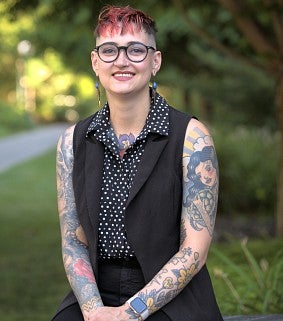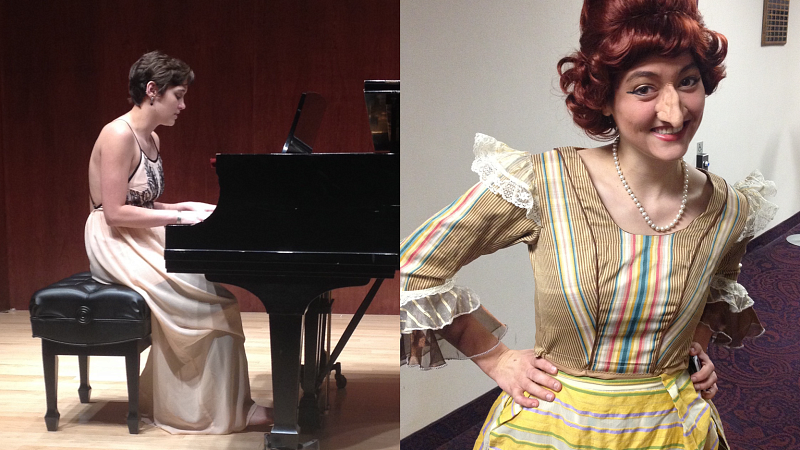
For three weeks, PhD candidate Emily Milius anxiously awaited one of the most important phone calls she would ever receive. She was eager to learn if she got the job as Visiting Assistant Professor at the University of North Carolina Greensboro. She had just applied for the position at the beginning of June, wrapped up a round of interviews on the 28th, and was told they would be in touch soon. On June 29th, her phone rang. It was good news.
“I held it together on the phone,” Emily recalled. “Then I just started crying. I was sobbing! I was over the moon.” But this was just the beginning. The clock started, and she had less than a month to move across the country from Eugene to North Carolina for the 2023–24 school year! She arrived in August and taught her first class on August 16. It was one of three sections of Aural Skills 3 that she will be teaching this semester. “I love teaching!” Emily said, “I get into the classroom, and I feel like it just energizes me.”
While she is not in the classroom, she is hosting office hours, attending meetings, prepping lesson plans, and writing her dissertation for the University of Oregon School of Music and Dance (SOMD). Prior to SOMD, she received her bachelor’s in vocal performance and master’s in music theory from Stephen F. Austin State University in Nacogdoches, Texas. After graduation, she taught music theory and history as an adjunct professor at Stephen F. Austin and Angelina College.
When she first moved from Texas to Eugene in 2019 to start her PhD in music theory, it was not only a physical journey but an emotional one. For three years, she had applied to several PhD programs in music theory around the country and was rejected by each. Discouraged but hopeful, she went to a conference in San Antonio, Texas where she met Dr. Stephen Rodgers. After discussing her research interests, he encouraged her to apply to SOMD’s PhD program, and she got in! “I felt really supported during the entire application process,” she said. “I really liked the program, and I was excited about the West Coast since I had never lived there before. The ocean, mountains, all the nature is gorgeous.”
Soon after arriving in Eugene, Emily knew she had made the right decision. She found her seminars on topics such as analyzing vocal timbre in pop songs and text and music analysis fascinating and intellectually stimulating, and her advisor and committee were welcoming and supportive. When it came time to write her dissertation, she chose a topic that was personal for her. She is examining the intersections of voice and trauma in popular music. More specifically, she is analyzing songs written and performed by women about sexual assault and shows how vocal timbre conveys their experience of trauma.
She was drawn to this topic for three reasons. One, she grew up singing pop, jazz, and R&B. She also performed in musicals. Her background as a singer drew her to question how artists make their songs expressive.

Emily performs an original song at her senior recital
Emily performs in an opera in undergrad
Second, she has always been interested in songs that make a profound impact on their listeners. And third, she is a survivor of sexual assault. “It is such a big problem, not only in society, but specifically in the music industry,” she said. “It is very prevalent within that industry. Talking about the way artists express that experience and how they feel afterwards, has been healing in a sense.”
Outside music and teaching, she researches psychology, feminist studies, race studies, sexuality studies, and pedagogy (especially trauma-informed pedagogy). “I really enjoy bringing all these ideas from outside of music studies into my music analysis and research as well,” she said. “Interdisciplinary research is very fulfilling to me, especially with topics that are very personal to me.”
Emily also enjoys visual art. She studied calligraphy growing up, alongside her grandfather, who was an architect and artist. “He started talking to me about calligraphy and got me a couple of calligraphy books and pens, and I dove in headfirst!” she remembered. “I just loved it.” Emily also loves the art of tattooing, a passion she developed at an early age. Growing up in a conservative household, she did not get her first tattoo until college. “Getting tattooed has been a great outlet, not only for creativity, but it is also therapeutic to me to get tattooed. They can tell such a beautiful life story and can be so amazingly exquisite and artistic.”
Currently, Emily lives in Greensboro with her sweet kitty, Forte. Her goal is to complete her SOMD dissertation by spring 2024 and she plans to continue teaching afterward.

